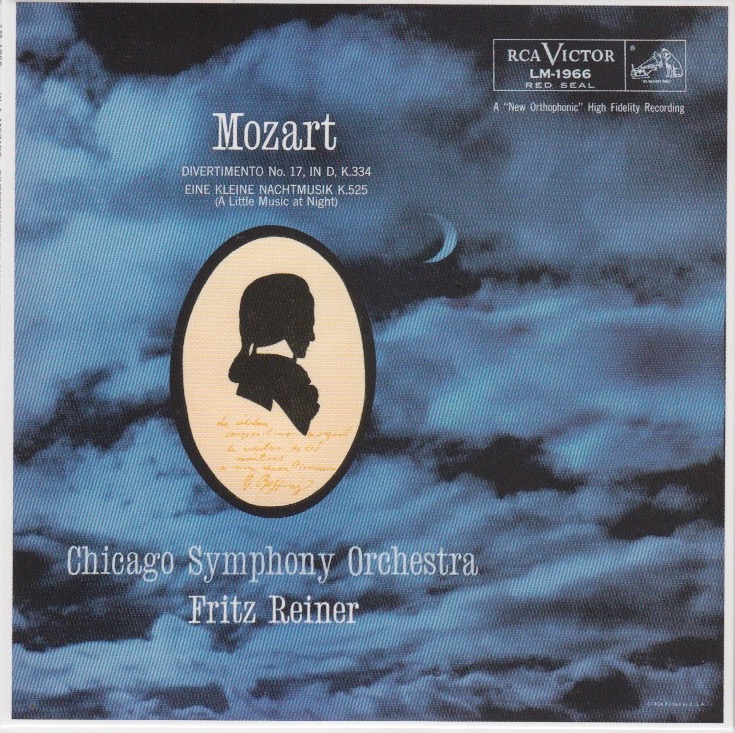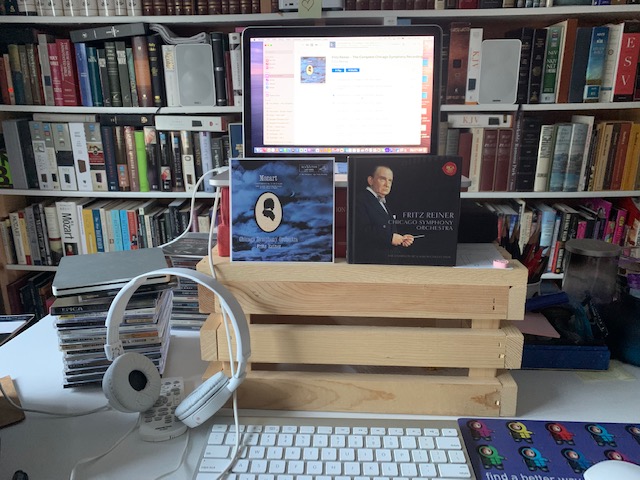
My listening post today for two Mozart compositions is, actually, tonight. I didn’t get around to listening this morning because I just wanted to sit in a restaurant and eat, not eat while listening to music and writing. Sue me.
As it turns out, it’s a good thing I didn’t decide to listen to the 8th CD in the Fritz Reiner box set this morning over breakfast.
When I sat down to do so tonight (with an ice-cold Carling Black Label beside me, as well as some pretzel rods and Win Schuler’s Original Cheddar cheese spread – obviously, I’m a health-food nut), I discovered that I hadn’t yet ripped CD 8 into iTunes.
Which means I would have been a bit miffed while I ate my Asiago bagel (toasted twice!) with plain cream cheese and sipped my Light Roast coffee.
So I’m glad I’m sitting here tonight in my library, now munching on Dried Papaya Chunks and drinking Evamor high alkaline water (I put away my previous snacks) while I listen to today’s CD and watch my cat sit on the windowsill.

Speaking of today’s CD, it’s two performances – Divertimento No. 17 in D and Eine Kleine Nachtmusik – from Wolfgang Amadeus Mozart, whomever that is. Judging by what I’m hearing, I think he has a bright future. I’ll be rooting for him.
Just kidding!
A decade ago, I spent 180 days listening to everything Mozart composed. I was thrilled and amazed. Those Philips recordings were vibrant, and I learned a great deal about Mozart, Classical music, instruments, and musicians. I recently purchased the new 200-CD Mozart box set, and am looking to spending 200 days listening to my second favorite composer (Beethoven being #1, and Bruckner coming in a very, very close #3).
Today, however, I’m listening to CD 8 from the Fritz Reiner Chicago Symphony Orchestra The Complete RCA Album Collection. And I’m not as thrilled as I remember being hearing the Philip edition of Mozart’s Divertimento No. 17 and Eine Kleine Nachtmusik.
Before I render my opinion (for what it’s worth), I always dive into the background of the pieces of music, and their composers.
So, from its entry on Wikipedia,
The Divertimento No. 17 in D major, K. 334/320b was composed by Wolfgang Amadeus Mozart between 1779 and 1780 and was probably for commemorating the graduation of a close friend of Mozart’s, Georg Sigismund Robinig, from his law studies at the University of Salzburg in 1780. Lasting about 42 minutes, it takes the longest to perform among the divertimenti by Mozart.
The third movement (the first Menuetto) from the divertimento remains so popular that it is often referred to as Mozart’s Minuet, although this is clearly not the only minuet by Mozart. An excerpt from this movement was used in the animated film Yellow Submarine (1968) when the string quartet was being annihilated by the Blue Meanies.
Mozart (1756-1791) composed this piece of music when he was around 24.
From its entry on Wikipedia,
Eine kleine Nachtmusik (Serenade No. 13 for strings in G major), K. 525, is a 1787 composition for a chamber ensemble by Wolfgang Amadeus Mozart. The German title means “a little serenade”, though it is often rendered more literally as “a little night music”.
The serenade was completed in Vienna on 10 August 1787, around the time Mozart was working on the second act of his opera Don Giovanni. It is not known why it was composed. Wolfgang Hildesheimer, noting that most of Mozart’s serenades were written on commission, suggests that this serenade, too, was a commission, whose origin and first performance were not recorded.
The traditionally used name of the work comes from the entry Mozart made for it in his personal catalog, which begins, “Eine kleine Nacht-Musik”. As Zaslaw and Cowdery point out, Mozart almost certainly was not giving the piece a special title, but only entering in his records that he had completed a little serenade.
I daresay, Eine Kleine Nachtmusik is probably one of the most, if not THE most, familiar Classical compositions of all time, even though people likely don’t know who wrote it. Beethoven, they know. Everybody knows Beethoven’s Fifth. And they know Beethoven composed it. But I’m not sure everybody knows who composed Eine Kleine Nachtmusik. Still, it has come to stand for Classical music, and a certain period in Classical music. Early Classical. Almost Baroque.
Mozart composed Eine Kleine Nachtmusik when he was 31.
It’s worth noting that Mozart’s creative output dwarfed that of nearly every other composer. Maybe every other composer – even people who lived twice as along. I was stunned to learn that Mozart died when he was 35, and yet his recorded output filled six whole months (180 days) of listening. No other composer I’ve listened to in that fashion comes close.
For me, Beethoven and Bruckner have more depth and pack a more emotional punch. But for sheer creativity, Mozart beats them all.
The Objective Stuff
Recorded at Orchestra Hall during the years 1954 and 1955. This CD is not designated “stereo,” so I suspect it’s a mono recording. Fritz Reiner (1888-1963) was 66 or 67 when he conducted it. The album was released on the RCA Victor Red Seal label.
The Subjective Stuff
Recording quality: 3.5
Overall musicianship: 3.5
CD booklet notes: 2
CD “album cover” information: 4
How does this make me feel: 2 (Divertimento)/4 (Eine Kleine Nachtmusik)
I think I know why I referred to a previous album as sounding “tinny” or like I was listening to it in the car, on AM radio: mono recording. This lacks the depth and breadth of one of RCA’s Living Stereo recordings, which are typically remarkable in their ability to reproduce music well.
This recording makes me feel like an outsider. Worse, like I’m an outsider listening to this being performed through a telephone, or from an iPhone recording.
So it’s hard for me to even judge the overall musicianship. Sounds okay to me. But because the recording is rather flat (probably because it’s mono), few instruments truly stand out. Oh, I can hear a French horn or two now and then. And it’s a lovely sound, too. Great instrument. But, as with many mono recordings, what we end up with is a wall of sound, an entire orchestra with an occasional instrument straining to be heard.
I thought the Divertimenti was okay. I’ve heard better. But the Eine Kleine Nachtmusik never fails to stir me. It’s such a perfectly composed piece of music, immediately recognizable and uplifting.
